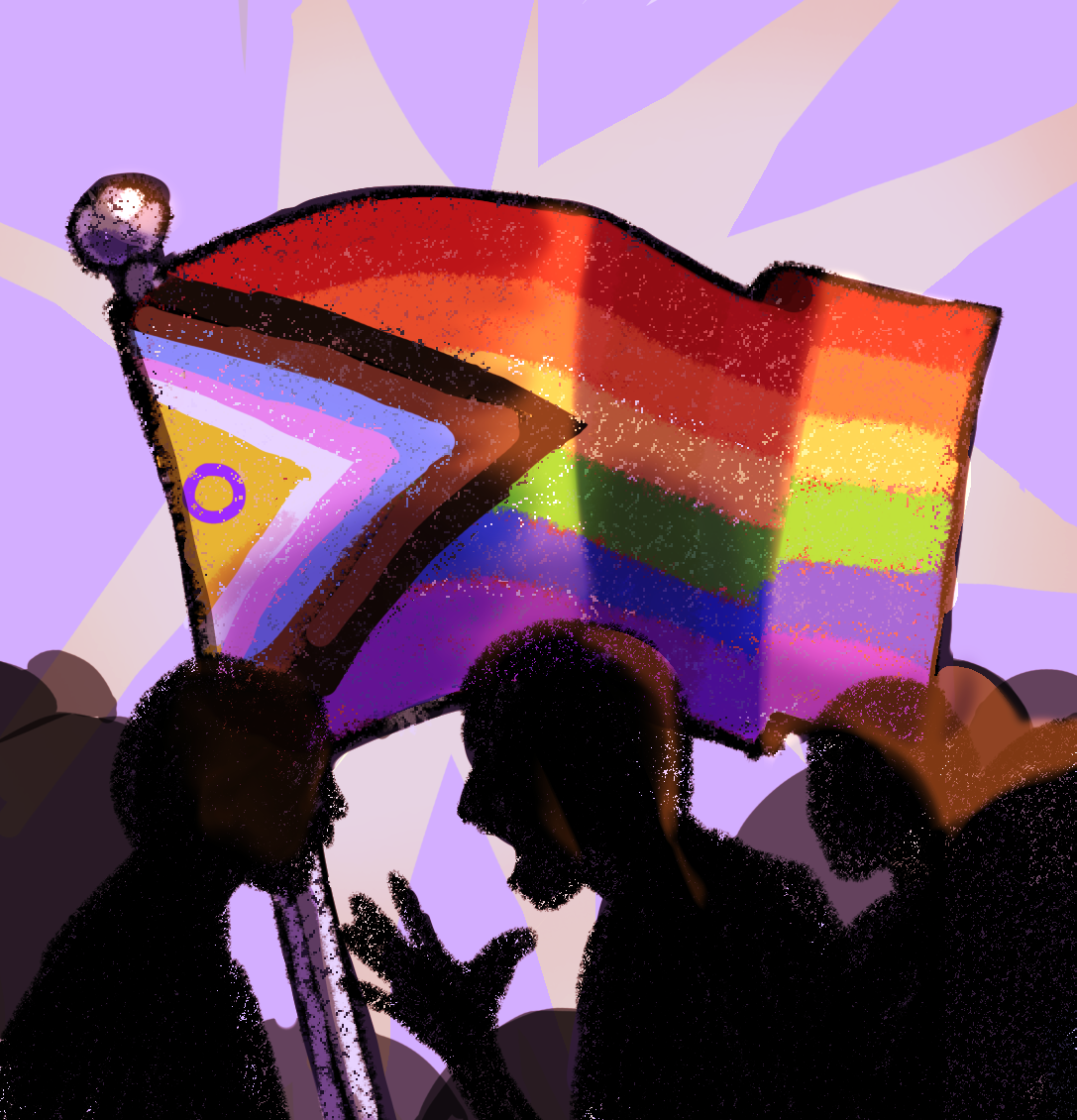Graphic by Kaden/OutWrite
Content warning: homophobia, discussions of genocide, hate crimes, gun violence, and settler colonization
When I was in high school, my friend and I fundraised and worked with our district to paint progress pride flags at each campus in the school district. While some called our project indoctrination, others claimed it was unnecessary because they believed this was an empty display of virtue signaling. However, as our right to queer expression continues to suffer heavy restrictions around the country, it is crucially empowering to permanently show that we are not leaving. Students may not feel safe at home, and affirming their identities decreases depression, anxiety, and suicide rates by allowing them to be themselves in school. The symbols used to identify people’s orientations and politics inform others of whom to trust.
Historically, censorship has often been used as a method of minority oppression. In Palestine, Israel banned the Palestinian flag and colors; they banned symbols of people’s existence to erase the people themselves. In America, states and cities are banning books and flags to erase queer and trans histories and realities. When coupled with bans on essential trans healthcare, they deny acknowledgment and respect for LGBTQ+ people as a whole.
As affirming as they are, symbols like flags have also been used as grounds for discrimination. The state has forced people to reveal aspects of their identities to enact violence; during the Holocaust, Jewish people were marked with yellow stars, queer people were marked with various triangles, and more. Today, people often wear kufiyas as a symbol of solidarity with people being hurt or killed for being Palestinian or even for publicly identifying in resistance to the oppressive genocide. For marginalized communities, outward symbols of identity risk state-enforced repercussions despite how empowering they are.
Today, all over the country — in school districts, cities, and even entire states — pride flags and queer expression are being limited and banned. As reported by “Erin in the Morning” last November, Murfreesboro, Tennessee prohibited being homosexual in public based on public indecency, and California school districts Temecula and Sunol have banned pride flags as of September 2023. In Hamtramck, Michigan, pride flags were outlawed from public grounds on the basis that “flying a Pride flag could potentially lead to other ‘radical or racist groups’ asking for their flags to be flown.”
The flags that dominant systems turn a blind eye to reveal their biases in social acceptance — they fail to challenge the status quo of American conservatism and militarism. At UCLA, where MAGA and Don’t Tread on Me flags are publicly displayed in the window above the LGBTQ+ Campus Resource Center, no one takes action to remove hate symbols. Likewise, the government does nothing to stop harmful mechanisms that hurt youth and destroy communities; gun violence and viruses tear through the country, killing millions. Guns, pandemics, and police and settler violence are much more lethal than flags, books, and education systems that encourage acceptance and destigmatization — yet it is the latter that governments focus their resources on suppressing.
Western governments (aided by individualist and xenophobic culture) have actively discouraged and stigmatized wearing masks to protect against COVID-19 despite the disease’s similarity to HIV in damaging T cells. COVID-19 is especially harmful to disempowered communities as it creates and perpetuates new layers of marginalization. The U.S. government, along with many others, didn’t — and still doesn’t — care about LGBTQ+ people affected by the (continuing) AIDS crisis, and the U.S. doesn’t work to protect marginalized populations today; it lets them continue to die from COVID-19, gun violence, and hate.
As communities, we are resilient and will continue fighting for our rights, but erasing visual symbols of existence makes it easier for peers and other populations to ignore oppression in other facets like healthcare and state-sanctioned violence. Settler-colonial states are enacting fascism through policy regulating representation and education (a.k.a., censorship) as a form of slow violence that allows for eventual eradication.
Credits:
Author: Ember Ireland (They/She)
Artist: Kaden (He/Him)
Copy Editors: Gracie Bitting (She/Her), Emma Blakely (They/She/He)

